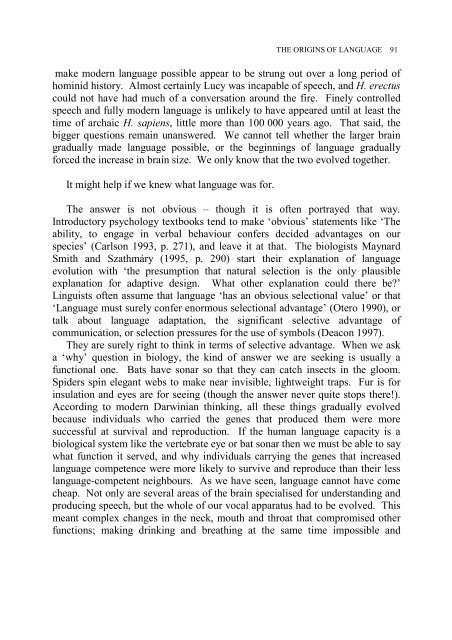The Meme Machine
TheMemeMachine1999
TheMemeMachine1999
- No tags were found...
You also want an ePaper? Increase the reach of your titles
YUMPU automatically turns print PDFs into web optimized ePapers that Google loves.
THE ORIGINS OF LANGUAGE 91<br />
make modern language possible appear to be strung out over a long period of<br />
hominid history. Almost certainly Lucy was incapable of speech, and H. erectus<br />
could not have had much of a conversation around the fire. Finely controlled<br />
speech and fully modern language is unlikely to have appeared until at least the<br />
time of archaic H. sapiens, little more than 100 000 years ago. That said, the<br />
bigger questions remain unanswered. We cannot tell whether the larger brain<br />
gradually made language possible, or the beginnings of language gradually<br />
forced the increase in brain size. We only know that the two evolved together.<br />
It might help if we knew what language was for.<br />
<strong>The</strong> answer is not obvious – though it is often portrayed that way.<br />
Introductory psychology textbooks tend to make ‘obvious’ statements like ‘<strong>The</strong><br />
ability, to engage in verbal behaviour confers decided advantages on our<br />
species’ (Carlson 1993, p. 271), and leave it at that. <strong>The</strong> biologists Maynard<br />
Smith and Szathmáry (1995, p. 290) start their explanation of language<br />
evolution with ‘the presumption that natural selection is the only plausible<br />
explanation for adaptive design. What other explanation could there be?’<br />
Linguists often assume that language ‘has an obvious selectional value’ or that<br />
‘Language must surely confer enormous selectional advantage’ (Otero 1990), or<br />
talk about language adaptation, the significant selective advantage of<br />
communication, or selection pressures for the use of symbols (Deacon 1997).<br />
<strong>The</strong>y are surely right to think in terms of selective advantage. When we ask<br />
a ‘why’ question in biology, the kind of answer we are seeking is usually a<br />
functional one. Bats have sonar so that they can catch insects in the gloom.<br />
Spiders spin elegant webs to make near invisible, lightweight traps. Fur is for<br />
insulation and eyes are for seeing (though the answer never quite stops there!).<br />
According to modern Darwinian thinking, all these things gradually evolved<br />
because individuals who carried the genes that produced them were more<br />
successful at survival and reproduction. If the human language capacity is a<br />
biological system like the vertebrate eye or bat sonar then we must be able to say<br />
what function it served, and why individuals carrying the genes that increased<br />
language competence were more likely to survive and reproduce than their less<br />
language-competent neighbours. As we have seen, language cannot have come<br />
cheap. Not only are several areas of the brain specialised for understanding and<br />
producing speech, but the whole of our vocal apparatus had to be evolved. This<br />
meant complex changes in the neck, mouth and throat that compromised other<br />
functions; making drinking and breathing at the same time impossible and



